For the 2025 school year, there is 1 public middle school serving 1,278 students in Jay School Corporation School District. This district's average middle testing ranking is 8/10, which is in the top 30% of public middle schools in Indiana.
Public Middle School in Jay School Corporation School District have an average math proficiency score of 37% (versus the Indiana public middle school average of 31%), and reading proficiency score of 44% (versus the 40% statewide average).
Minority enrollment is 11% of the student body (majority Hispanic), which is less than the Indiana public middle school average of 36% (majority Black and Hispanic).
Overview
This School District
This State (IN)
# Schools
6 Schools
576 Schools
# Students
2,987 Students
286,750 Students
# Teachers
216 Teachers
19,838 Teachers
Student : Teacher Ratio
14:1
14:1
District Rank
Jay School Corporation School District, which is ranked within the top 50% of all 394 school districts in Indiana (based off of combined math and reading proficiency testing data) for the 2021-2022 school year.
The school district's graduation rate of 83% has decreased from 96% over five school years.
Overall District Rank
#132 out of 400 school districts
(Top 50%)
(Top 50%)
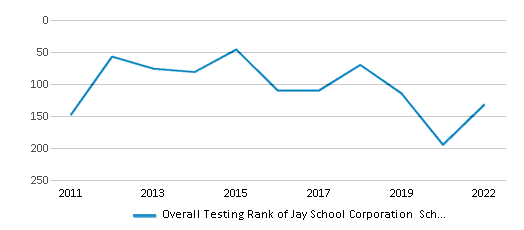
Math Test Scores (% Proficient)
44%
38%
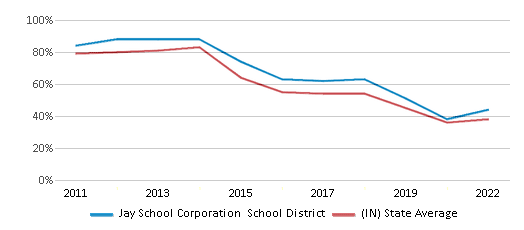
Reading/Language Arts Test Scores (% Proficient)
42%
41%
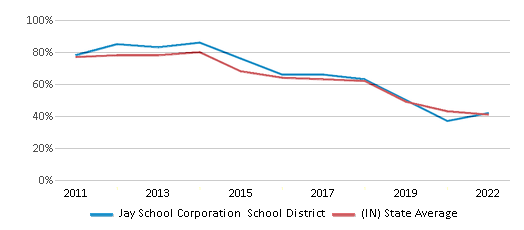
Science Test Scores (% Proficient)
32%
34%
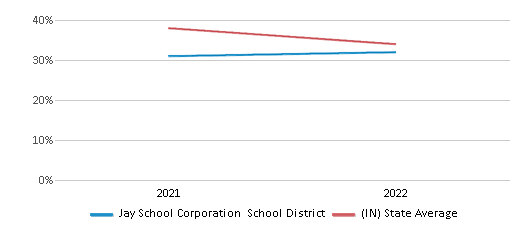
Graduation Rate
83%
88%
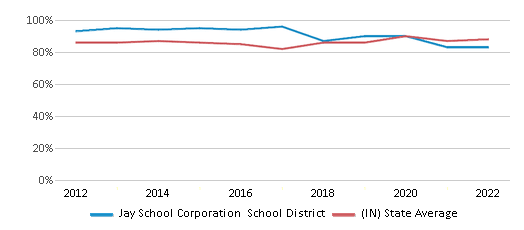
Students by Ethnicity:
Diversity Score
0.20
0.55
# American Indian Students
3 Students
487 Students
% American Indian Students
n/a
n/a
# Asian Students
14 Students
7,060 Students
% Asian Students
n/a
3%
# Hispanic Students
235 Students
38,734 Students
% Hispanic Students
8%
14%
# Black Students
16 Students
41,316 Students
% Black Students
1%
14%
# White Students
2,663 Students
183,320 Students
% White Students
89%
64%
# Hawaiian Students
1 Student
393 Students
% Hawaiian Students
n/a
n/a
# Two or more races Students
55 Students
15,440 Students
% of Two or more races Students
2%
5%
Students by Grade:
# Students in PK Grade:
55
895
# Students in K Grade:
257
4,381
# Students in 1st Grade:
220
4,494
# Students in 2nd Grade:
255
4,603
# Students in 3rd Grade:
251
4,543
# Students in 4th Grade:
220
4,581
# Students in 5th Grade:
233
9,646
# Students in 6th Grade:
215
45,633
# Students in 7th Grade:
259
76,601
# Students in 8th Grade:
214
78,092
# Students in 9th Grade:
203
12,669
# Students in 10th Grade:
208
13,766
# Students in 11th Grade:
192
13,563
# Students in 12th Grade:
197
13,042
# Ungraded Students:
8
241
District Revenue and Spending
The revenue/student of $14,009 is higher than the state median of $13,214. The school district revenue/student has stayed relatively flat over four school years.
The school district's spending/student of $12,667 is less than the state median of $12,844. The school district spending/student has stayed relatively flat over four school years.
Total Revenue
$42 MM
$13,615 MM
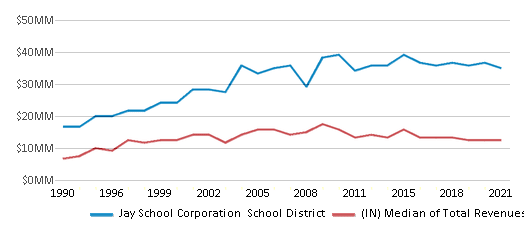
Spending
$38 MM
$13,234 MM
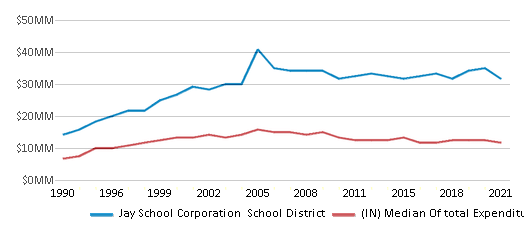
Revenue / Student
$14,009
$13,214
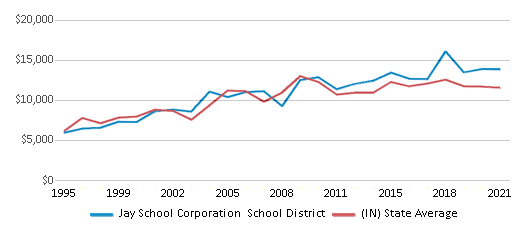
Spending / Student
$12,667
$12,844
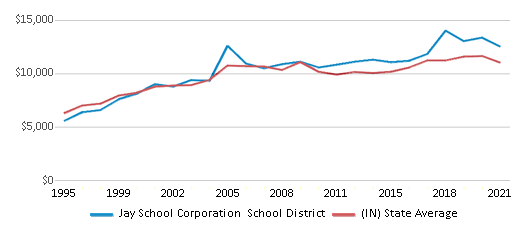
Best Jay School Corporation School District Public Middle Schools (2025)
School
(Math and Reading Proficiency)
(Math and Reading Proficiency)
Location
Grades
Students
Rank: #11.
Jay County Jr/sr High School
(Math: 37% | Reading: 44%)
Rank:
Rank:
6/
Top 50%10
2072 W Sr 67
Portland, IN 47371
(260) 726-9306
Portland, IN 47371
(260) 726-9306
Grades: 7-12
| 1,278 students
Recent Articles

What Is A Charter School?
Explore the world of charter schools in this comprehensive guide. Learn about their history, how they operate, and the pros and cons of this educational innovation. Discover key facts about charter schools, including admission policies, demographics, and funding, as well as what to look for when considering a charter school for your child.

10 Reasons Why High School Sports Benefit Students
Discover the 10 compelling reasons why high school sports are beneficial for students. This comprehensive article explores how athletics enhance academic performance, foster personal growth, and develop crucial life skills. From improved fitness and time management to leadership development and community representation, learn why participating in high school sports can be a game-changer for students' overall success and well-being.

February 05, 2025
Understanding the U.S. Department of Education: Structure, Impact, and EvolutionWe explore how the Department of Education shapes American education, from its cabinet-level leadership to its impact on millions of students, written for general audiences seeking clarity on this vital institution.





